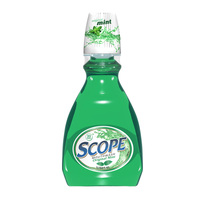 (To the tune of Norah Jones' Come Away With Me.) I'm paying a fortune to get my Master's in Strategic Communications from Columbia on Tuesday and Wednesday nights, so I thought I'd share a few cents' worth of wisdom with anybody who stumbles across this blog. Tonight, I gave a presentation on Scope mouthwash. We have been working on our abilities to articulate a brand's position, i.e. the unique place it occupies in the consumer's mind, and the assignment this week was to do so by uncovering unique customer insights. For three weeks, I've been interviewing my friends and family (and even a few friendly-looking strangers in bars) about their mouthwash habits. Yep, swirl it, gargle it, or avoid it, I've been trying to talk to you about it. (If you actually answered my questions, thanks again! If you didn't, I will stalk you harder next time.) Mouthwash is a personal topic, and a complex industry, but don't worry, I've managed to squeeze everything I could ever want to say on the topic into twenty colorful, Dr. Suess-inspired slides.  Check it out! I think my presentation tonight went really well. So what if I did a practice run earlier for a six-year-old and he gave me an F? He's not even old enough to use mouthwash! Tonight's wisdom takes the form of a quick primer on communications strategy: A strategy has the following parts. (So far; we're only halfway through the semester!) Communications objective (what tangible measurable thing do you want to have happen as a result of your communications strategy?) Single best competitive advantage (you know, from Marketing 101 - what is that one, best, unique thing about your brand?) Communications role (what feeling or belief (about your brand) do you want to create, change, modify, or amplify?) Target audience (duh, who you're targeting. Pick a group you'll be able to a) reach and b) affect.) Critical insight (an opinion that your audience already has that will motivate them to have the feelings for your brand that you're trying to get them to have.) For examples of these things, check out my presentation here. See if you like it better than the six-year-old did. The second piece of wisdom is that, while Listerine's marketers didn't invent the word "halitosis" to transform bad breath into a medical condition as is sometimes believed, they did popularize the use of the word.
0 Comments
Leave a Reply. |
About this blog
I'll use this space to write about movies, bikes, communications trends, pop culture, and my adventures as a new New Yorker. Archives
May 2012
Categories
All
|
 RSS Feed
RSS Feed